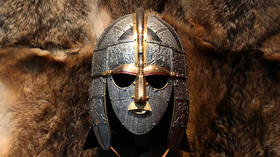Anglo-Saxons didn’t exist – Cambridge University
Studying the direct predecessors of the modern English is not “anti-racist” enough for the university, the Telegraph reported

Cambridge University is teaching students that the Anglo-Saxons never existed as a distinct ethnic group, in an effort to “dismantle the… myths” of English nationalism, the Telegraph reported on Saturday. Liberal academics have long decried the term for its association with “whiteness.”
Cambridge’s Department of Anglo-Saxon, Norse and Celtic (ASNC) will seek “to dismantle the basis of myths of nationalism – that there ever was a ‘British’, ‘English’, ‘Scottish’, ‘Welsh’ or ‘Irish’ people with a coherent and ancient ethnic identity – by showing students just how constructed and contingent these identities are and always have been,” the British newspaper reported, citing information from the university.
By denigrating the idea of a distinct Anglo-Saxon identity, the university said that it aims to make its teaching more “anti-racist.”
The controversy over the term ‘Anglo-Saxon’ began in 2019, when Canadian academic Dr Mary Rambaran-Olm resigned from the International Society of Anglo-Saxonists over the “inherent whiteness” of the field. Rambaran-Olm, who is not white, went on to write that “the Anglo-Saxon myth perpetuates a false idea of what it means to be ‘native’ to Britain,” and that the term is “historically inaccurate.”
The society changed its name to the International Society for the Study of Early Medieval England, but some academics were furious, describing the controversy as an attempt to impose American racial identity politics onto a British field of study. “The conditions in which the term is encountered, and how it is perceived, are very different in the USA from elsewhere,” 70 historians wrote in an open letter in 2020.
“It’s a continuation of what’s been going on for some years, where pride in national identity is being attacked,” political commentator Anthony Webber told RT. Pointing out that the modern-day English owe a third of their ancestry to the Anglo-Saxons, he added: “I don't think it serves the cause of anti-racism to suddenly make sections of the population feel that they shouldn’t be proud of their background.”
Historically, the Anglo-Saxon period denotes the time between around 450 and 1066 AD. During this period, Germanic peoples – Angles, Saxons, and Jutes – arrived in Britain and established kingdoms that were consolidated into the Kingdom of England by Athelstan of Wessex in 927. This period saw the development of the first iteration of the English language and the creation of epic poems like Beowulf and Waldere.
So influential were the Anglo-Saxons on modern British and American culture that the French and Russians use the term as shorthand for English-speaking elites on both sides of the Atlantic.


0 Comments:
Post a Comment
Subscribe to Post Comments [Atom]
<< Home